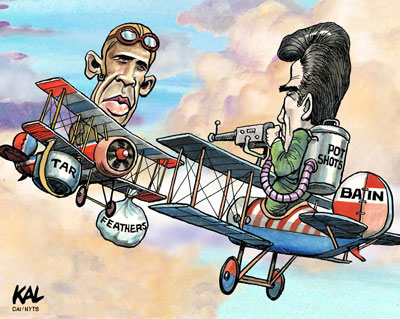
Paul Krugman: A Nation Is Not a Business
Paul Krugman, Krugman & Co. | Op Ed
President Obama gets this exactly right: "When some people question why I would challenge [Mitt Romney's] Bain record," he told CBS News on July 13, "the point I've made there in the past is, if you're a head of a large private equity firm or hedge fund, your job is to make money. It's not to create jobs. It's not even to create a successful business — it's to make sure that you're maximizing returns for your investor."
A country is not a company — and it's definitely not a private equity firm.
And here's the thing: Mr. Romney is running for president entirely on the basis of his business success. In a better world he could be running on the basis of his successful health reform, but now he's condemning that very achievement.
In a better world he could actually be running on the basis of coherent policy ideas, but instead he's offering nothing but a mix of tax cuts for the rich and benefit cuts for the middle class so extreme that focus groups refuse to believe that this is his actual proposal.
Once the Bain Capital record becomes a liability instead of a strength, there's nothing there.
 (Image: CartoonArts International / NYT Syndicate)
(Image: CartoonArts International / NYT Syndicate)
No Bain, No Gain
There is, predictably, a mini-backlash against the Obama campaign's focus on Bain. Some of it is coming from the Very Serious People, who think that we should be discussing their usual preoccupations. But some of it is coming from progressives, some of whom are apparently uncomfortable with the notion of going after Mr. Romney the man and wish that the White House would focus solely on Mr. Romney's policy proposals.
This is remarkably naive. I agree that the awfulness of Mr. Romney's policy proposals is the main argument against his candidacy. But the Bain focus isn't a diversion from that issue, it's complementary. Given the realities of politics — and of the news media, as I'll explain in a minute — any critique of Mr. Romney's policies has to make use of his biography.
The first point is that voters are not policy wonks. They do not go to the Tax Policy Center Web site to check out distribution tables. And if a politician cites those distribution tables in his speeches, well, politicians say all kinds of things.
Nor, alas, can we rely on the news media to get the essentials of the policy debate across to the public — and not just because so many people get their news in quick snatches via TV. The sad truth is that the cult of balance still rules. If a Republican candidate announced a plan that in effect sells children into indentured servitude, the news reports would be that "Democrats say" that the plan sells children into indentured servitude, with each quote to that effect matched by a quote from a Republican saying the opposite.
Remember, Republicans have already voted for a plan that would convert Medicare into a system of inadequate vouchers bearing no resemblance to the program we currently have — yet Politifact declared Democrats' claim that this ends Medicare as we know it the "lie of the year."
So running on the real policy issues by itself isn't going to work.
By all means, run on the real issues — but do so by creating a narrative, a pattern that registers with the Public.
And Mr. Romney's biography offers a golden opportunity to do just that. His policy proposals amount to a radical redistribution of income away from the middle class to the very rich; he's also being highly dishonest about budgets and just about everything else. How to make those true facts credible? By associating them with his business career, which involved a lot of profiting by laying off workers and/or taking away their benefits; his personal finances, which involved so much tax avoidance that he's afraid to let us see his returns before 2010; his shiftiness over when exactly he left Bain.
You could criticize the biographical focus if it were being used to convey a false impression of where Romney stands, but that's not what's going on here; instead, it's being used to get the truth about the candidate past the noise and the media barrier.
The truth is that the Obama campaign would be doing the American people a disservice if it didn't make the most of Bain.
Truthout has licensed this content. It may not be reproduced by any other source and is not covered by our Creative Commons license.
Paul Krugman joined The New York Times in 1999 as a columnist on the Op-Ed page and continues as a professor of economics and international affairs at Princeton University. He was awarded the Nobel in economic science in 2008. Mr Krugman is the author or editor of 20 books and more than 200 papers in professional journals and edited volumes, including "The Return of Depression Economics" (2008) and "The Conscience of a Liberal" (2007).
